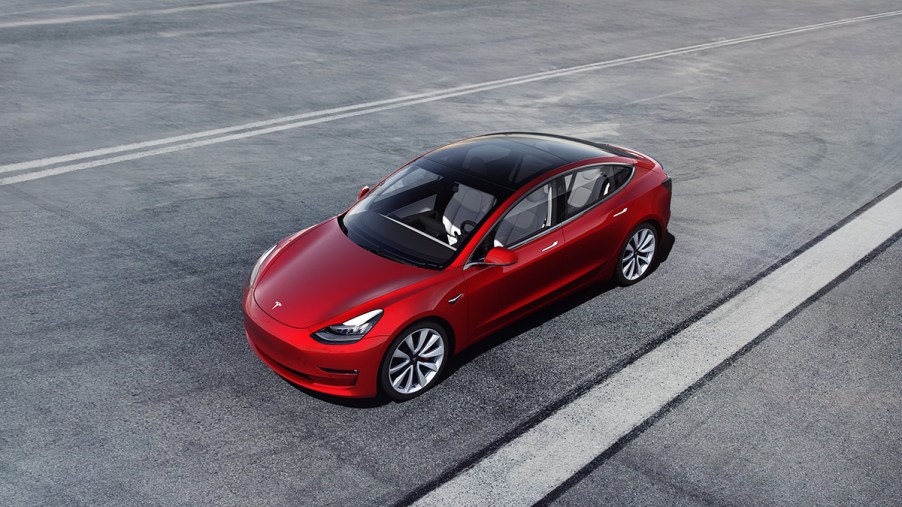
NHTSA Sends Tesla a Cease-and-Desist Letter
The U.S. National Highway Traffic Safety Administration sent a cease-and-desist letter last year to Tesla about “misleading statements” about the safety rating of the company’s Model 3 sedan.
It started with a blog post
Agency lawyers cited a Tesla blog post published on October 7, 2018. In the post, Tesla claimed the NHTSA tests demonstrated that Model 3 had a lower probability of injury than any other car the agency had ever assessed.
Jonathan Morrison, NHTSA Chief Counsel sent a letter to Elon Musk, Tesla’s CEO, that same month. In the letter, Morrison says the NHTSA became aware of the misleading claims Tesla was making about the safety rating of one of its vehicles.
The claims the company made weren’t consistent with NHTSA advertising policies regarding crash ratings. Legal transparency website PlainSite published the documents from the NHTSA, obtained through a Freedom of Information Act request. The agency said it had also referred the issue to the Federal Trade Commission’s Bureau of Consumer Protection.
Scrutinizing Tesla
Tesla, it seems, has disregarded NHTSA guidelines before “in a manner that may lead to consumer confusion and give Tesla an unfair market advantage.”
After the blog post published, the NHTSA did dispute Tesla’s claims in a public manner. The agency made a point to mention that there wasn’t a “safest” ranking on its five-star crash test ranking system.
The agency has also subpoenaed the automaker for data on several crashes according to records posted on PlainSite. One of those crashes was the fatal March 1st crash involving a Model 3 that had the Autopilot engaged at the time. Tesla’s Autopilot is its advanced driver-assistance system which it hopes will enable the company to offer self-driving cars in the future.
Responding to the NHTSA, Tesla maintained that its blog used actual test results along with the NHTSA’s own estimations to assess the likelihood of injury in its vehicle along with the risk of injury.
Based on that information, Tesla claimed its long-range rear-wheel-drive Model 3 had a 0.38 Vehicle Safety Score with an injury probability of 5.7%. The company went on to say that no other vehicle had achieved such a lower (more favorable) score.
The NHTSA expressed in an email its commitment to thorough and appropriate safety oversight of the industry. The agency encourages any possible safety risks to be reported to them. They explained that the 5-star safety rating system they use provides consumers with complete safety information in new vehicles. The agency’s Special Crash Investigation (SCI) program examines more than 100 crashes each year. They explained that there is often a variety of issues and manufacturers in cases of interest.
Not the first time
The NHTSA has encountered similar issues with Tesla in the past. In 2013, the agency issued a similar statement when Tesla claimed its Model S achieved a 5.4-star safety rating. The agency doesn’t actually have a rating that’s above 5 stars.
In response, Tesla’s deputy general counsel Al Prescott replied in a letter saying the company disagreed respectfully with the agency. Prescott said Tesla provided customers with fair and objective data so they could compare the safety of vehicles that had overall 5-star ratings.
While Tesla’s claims about his company’s vehicles are sometimes over-the-top, they aren’t made to conceal any lack. Where many CEO’s have a tendency to carefully monitor their speech to avoid controversy, Musk seems to enjoy courting controversy which has earned him the devotion of his many admirers.
Teslas, in truth, are among the safest vehicles in their categories. Both Tesla’s Model S and Model X achieved 5-star safety ratings in all NHTSA crash tests, the highest score. Tesla results in the rollover risk assessment were 50% better than its peers. The results in the pole test were nine times better than other “safe” cars like Volvo’s S60.
Tesla cars did just as well in Euro NCAP’s tests. The Model 3 received a “superior rating for front crash prevention” from the Insurance Institute for Highway Safety.


